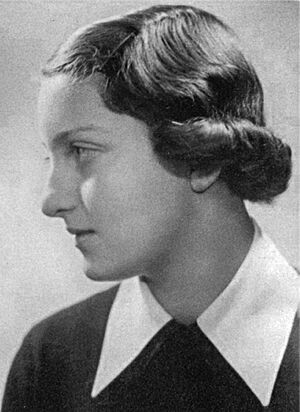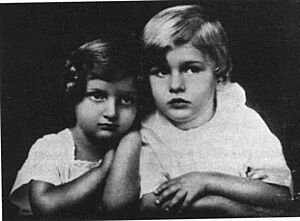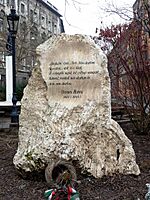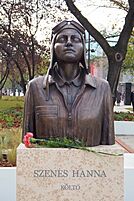Hannah Szenes facts for kids
Quick facts for kids
Hannah Szenes
|
|
|---|---|

Szenes in 1939
|
|
| Born | 17 July 1921 Budapest, Hungary |
| Died | 7 November 1944 (aged 23) Budapest, Hungary |
| Buried |
Mount Herzl Military Cemetery, Israel
|
| Allegiance | |
| Service/ |
|
| Years of service | 1943–1944 |
| Unit | Special Operations Executive (SOE) |
| Battles/wars | Second World War |
| Writing career | |
| Genre | Lyric poetry |
| Notable works |
|
Hannah Szenes (born 17 July 1921 – died 7 November 1944) was a brave Hungarian Jewish poet. She was also a member of the Special Operations Executive (SOE), a special British group during World War II.
Hannah was one of 37 Jewish volunteers from Mandatory Palestine who parachuted into Yugoslavia. Their mission was to help people fighting against the Nazis. They also hoped to rescue Hungarian Jews who were in danger of being sent to the Auschwitz death camp.
Sadly, Hannah was caught at the Hungarian border. She was put in prison and treated very harshly. But she refused to share any secrets about her mission. She was later put on trial and executed by a firing squad.
Today, Hannah Szenes is seen as a national hero in Israel. Many people know her poems. A Kibbutz (a community settlement) and several streets are named after her.
Contents
Early Life
Hannah Szenes was born in Budapest, Hungary, on July 17, 1921. Her family was Jewish but lived like many other Hungarian families. Her father, Béla, was a well-known writer and journalist. He passed away when Hannah was a child. She lived with her mother, Catherine, and her brother, György.
Hannah went to a private school for girls. It was a Protestant school, but it also accepted Catholic and Jewish students. However, Jewish students had to pay three times more than Protestant students. Her mother thought this was too expensive. So, Hannah was declared a "gifted student." This allowed her to pay only double the usual amount.
As Hannah grew up, she realized that Jewish people in Hungary were facing danger. This made her become a Zionist. Zionism is the idea of Jewish people having their own homeland. She joined a youth group called Maccabea and learned Hebrew.
Moving to Palestine
After finishing school in 1939, Hannah decided to move to Mandatory Palestine. This area is now Israel. She went to study at the Girls' Agricultural School in Nahalal.
In 1941, she joined Kibbutz Sdot Yam. A kibbutz is a special community where people live and work together. Later, she joined the Haganah. This was a group that acted like an army. It helped protect Jewish communities in Palestine.
In 1943, Hannah joined the British Women's Auxiliary Air Force. Later that year, she was chosen for the Special Operations Executive (SOE). She was sent to Egypt for special training, including how to parachute.
The Parachutists' Mission
Between 1943 and 1944, the Jewish community in Palestine decided to help. They wanted to send Jewish parachutists behind enemy lines. These brave people would help the Allied forces. They also aimed to help Jews living in Nazi-occupied Europe.
This mission was a team effort between the Jewish community and the British army. They wanted to create a special Jewish commando unit. Hannah volunteered for this dangerous mission. Out of 250 people, she was one of 32 chosen for active duty.
Trial and Execution
Hannah was put on trial in Hungary on October 28, 1944. She was accused of treason by the harsh Arrow Cross government. The judges delayed the decision several times. They needed more time to decide her fate.
She was executed by a firing squad on November 7, 1944. Hannah kept a diary until her last day. In one entry, she wrote: "In the month of July, I shall be twenty-three/I played a number in a game/The dice have rolled. I have lost." Another entry simply said: "I loved the warm sunlight."
Her diary was published in Hebrew in 1946. In 1950, her remains were brought to Israel. She was buried in the cemetery on Mount Herzl in Jerusalem. Her original tombstone was also brought to Israel in 2007. It was placed in Sdot Yam.
Years later, a Hungarian military court officially cleared her name. Her family in Israel learned about this on November 5, 1993.
Poetry and Songs
Hannah Szenes was a talented poet and writer. She wrote in both Hungarian and Hebrew. Her most famous poem is "A Walk to Caesarea." It is often known by its Hebrew name, Eli, Eli ("My God, My God").
A well-known tune was composed for the poem by David Zahavi. Many famous singers have performed it. The song was even used at the end of some versions of the movie Schindler's List.
Images for kids
-
Hannah Szenes dressed in a Hungarian army uniform for Purim
-
Hannah Szenes's gravestone on Mount Herzl
See also
- Jewish Parachutists of Mandate Palestine









